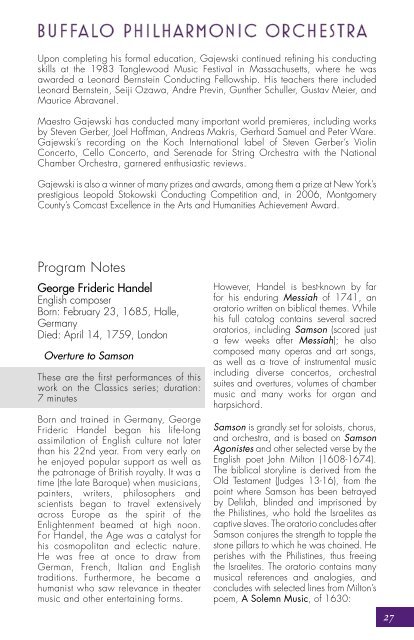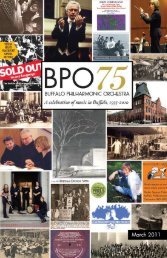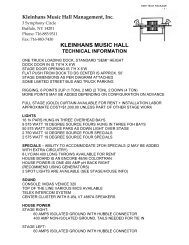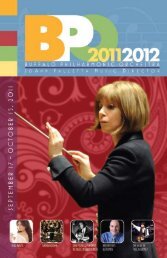Untitled - The Buffalo Philharmonic Orchestra
Untitled - The Buffalo Philharmonic Orchestra
Untitled - The Buffalo Philharmonic Orchestra
You also want an ePaper? Increase the reach of your titles
YUMPU automatically turns print PDFs into web optimized ePapers that Google loves.
Upon completing his formal education, Gajewski continued refining his conducting<br />
skills at the 1983 Tanglewood Music Festival in Massachusetts, where he was<br />
awarded a Leonard Bernstein Conducting Fellowship. His teachers there included<br />
Leonard Bernstein, Seiji Ozawa, Andre Previn, Gunther Schuller, Gustav Meier, and<br />
Maurice Abravanel.<br />
Maestro Gajewski has conducted many important world premieres, including works<br />
by Steven Gerber, Joel Hoffman, Andreas Makris, Gerhard Samuel and Peter Ware.<br />
Gajewski’s recording on the Koch International label of Steven Gerber’s Violin<br />
Concerto, Cello Concerto, and Serenade for String <strong>Orchestra</strong> with the National<br />
Chamber <strong>Orchestra</strong>, garnered enthusiastic reviews.<br />
Gajewski is also a winner of many prizes and awards, among them a prize at New York’s<br />
prestigious Leopold Stokowski Conducting Competition and, in 2006, Montgomery<br />
County’s Comcast Excellence in the Arts and Humanities Achievement Award.<br />
Program Notes<br />
George frideric handel<br />
English composer<br />
Born: February 23, 1685, Halle,<br />
Germany<br />
Died: April 14, 1759, London<br />
Overture to Samson<br />
<strong>The</strong>se are the first performances of this<br />
work on the Classics series; duration:<br />
7 minutes<br />
Born and trained in Germany, George<br />
Frideric Handel began his life-long<br />
assimilation of English culture not later<br />
than his 22nd year. From very early on<br />
he enjoyed popular support as well as<br />
the patronage of British royalty. It was a<br />
time (the late Baroque) when musicians,<br />
painters, writers, philosophers and<br />
scientists began to travel extensively<br />
across Europe as the spirit of the<br />
Enlightenment beamed at high noon.<br />
For Handel, the Age was a catalyst for<br />
his cosmopolitan and eclectic nature.<br />
He was free at once to draw from<br />
German, French, Italian and English<br />
traditions. Furthermore, he became a<br />
humanist who saw relevance in theater<br />
music and other entertaining forms.<br />
However, Handel is best-known by far<br />
for his enduring Messiah of 1741, an<br />
oratorio written on biblical themes. While<br />
his full catalog contains several sacred<br />
oratorios, including Samson (scored just<br />
a few weeks after Messiah); he also<br />
composed many operas and art songs,<br />
as well as a trove of instrumental music<br />
including diverse concertos, orchestral<br />
suites and overtures, volumes of chamber<br />
music and many works for organ and<br />
harpsichord.<br />
Samson is grandly set for soloists, chorus,<br />
and orchestra, and is based on Samson<br />
Agonistes and other selected verse by the<br />
English poet John Milton (1608-1674).<br />
<strong>The</strong> biblical storyline is derived from the<br />
Old Testament (Judges 13-16), from the<br />
point where Samson has been betrayed<br />
by Delilah, blinded and imprisoned by<br />
the Philistines, who hold the Israelites as<br />
captive slaves. <strong>The</strong> oratorio concludes after<br />
Samson conjures the strength to topple the<br />
stone pillars to which he was chained. He<br />
perishes with the Philistines, thus freeing<br />
the Israelites. <strong>The</strong> oratorio contains many<br />
musical references and analogies, and<br />
concludes with selected lines from Milton’s<br />
poem, A Solemn Music, of 1630:<br />
27






